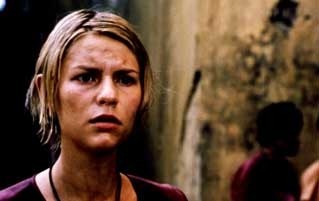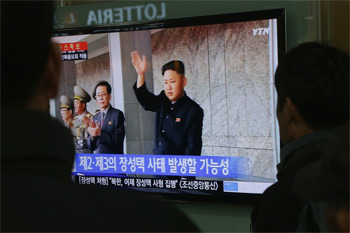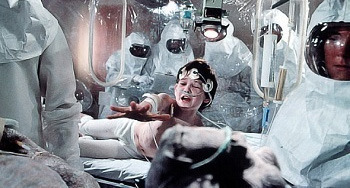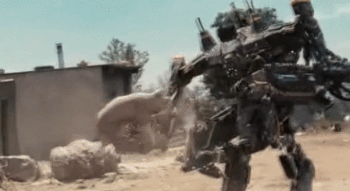6 Movies Banned By Countries For Funny Reasons

Censorship of movies is rarely justified, but at least most of the time it manages to make some kind of sense, like blurring out Harvey Keitel's penis or digitally removing all of the human actors from a Transformers movie. But the world is a diverse place, full of all different kinds of crazy, which means some of the international bans on famous movies just sound like nonsense:
The Philippines Banned Every Movie Starring Claire Danes

Brokedown Palace is a 1999 drama that most of you have never seen which tells the story of two women getting arrested and imprisoned in Thailand for drug smuggling. Because the film is critical of the Thai government, the movie's producers decided to shoot the whole thing in the Philippines instead, correctly reasoning that nobody would be able to tell the difference. As they expected, Brokedown Palace was totally banned in Thailand when it was finally released in theaters. A bit more unexpected was the film's stone-fisted expulsion from the Philippines, who banned the movie after star Claire Danes did her absolute best to talk as much shit about the Philippines as she possibly could while they were filming.

Double when you include the shit dialogue.
In a series of interviews for Vogue and Premiere magazines, Danes lamented that the Filipino capital of Manila was a "ghastly and weird city," and that getting paid millions of dollars to film a movie there for three months "was just so hard." She didn't stop there:
The place just fucking smelled of cockroaches. There's no sewage system in Manila, and people have nothing there. People with, like, no arms, no legs, no eyes, no teeth. We shot in a real hospital, so takes would be interrupted by wailing women, like, "Cut! Screaming person." Rats were everywhere.
Manila, according to Danes, was essentially a giant toilet full of crazy people.

Yeah, screaming people sure do suck.
Danes' comments didn't please the president of the Philippines, Joseph Estrada. Not only did he respond by banning Brokedown Palace from being screened in the country, he went so far as to ban all of Danes' films in perpetuity, and he forbade her from entering the country until she issued a formal apology. Her passive-aggressive version of said apology went as follows:
Because of the subject matter of our film Brokedown Palace, the cast was exposed to the darker and more impoverished places of Manila. My comments in Premiere magazine only reflect those locations, not my attitude towards the Filipino people. They were nothing but warm, friendly, and supportive.

"The rats can go fuck themselves, though."
This was apparently the equivalent of writing the words "I'm sorry" on a kazoo and playing it with her asshole. A spokesperson for the Philippine government called it an "excuse made by Hollywood press officers and not a genuine apology." The went on to say, "We know if an apology is true or not. ... We will lift the ban only if we are satisfied." That was 15 years ago, and it doesn't appear they ever formally lifted the ban. Though they did allow citizens to see movies like Terminator 3 and Stardust, possibly because they didn't realize Danes was in them.
Meanwhile, the country has turned its ire on Justin Bieber because he mocked Filipino boxer Manny Pacquiao on Instagram, leading to calls to ban the singer from visiting the country and demands for a boycott of his albums. Damn, son. You do not talk shit about the Philippines.
North Korea Banned 2012 Because of Their Own 2012 Predictions

North Korea famously has a varsity letter in both craziness and nonsensical oppression, so it's not too surprising to learn that they've banned their fair share of movies for ridiculous reasons. So when we say, "North Korea forbade anyone from seeing Roland Emmerich's 2012," you might be thinking, "That makes sense. Did they ban it for showing the destruction of some important Korean landmark, or just because it's the worst fucking movie ever made?" Neither. They banned it because it ran counter to their own crazypants prophecies about the year 2012.
You see, 2012 was the 100-year anniversary of the birth of North Korea's founder, Kim Il Sung, which for them was a time of great celebration that unfortunately happened to coincide with Emmerich's babbling pseudoscience about Mayan Armageddon. While Kim's grand anniversary was gearing up to be a bitching shindig promising to "open the grand gates to becoming a rising superpower," Emmerich's movie foretold mass drownings and the death of Woody Harrelson, both of which will instantly ruin a party.

He died doing what he loved: getting lit up.
So, not only did North Korea ban the film from screening, they levied massive fines and even tossed in prison time for anyone caught with a bootleg copy of 2012, charging any offenders with "a grave provocation against the development of the state."

It's No. 534 on the government's grave provocation list, after "hair mockery" but before "breathing."
Kim Jong Il died in December 2011, so he didn't actually live to see whether his or Emmerich's prediction came true (spoiler alert: neither did). North Korea remains a struggling dictatorship, Harrelson is alive and well, and Emmerich is getting ready to hand out two sequels to Independence Day that absolutely nobody asked for.

Those slack-ass Mayans have until June 2016 to unleash the meteors and save us all.
Scandinavia Banned Kids From Seeing E.T. Because It Makes Adults Look Like Assholes

If you were alive in the '80s, Steven Spielberg's classic E.T. the Extra-Terrestrial had a huge impact on your childhood, whether it was because you were delighted by his heartwarming story or terrified of his nightmarish, wrinkled, mutant turd appearance. That is, unless you grew up in Sweden, Finland, or Norway, where anyone under the age of 12 was banned from seeing the movie when it was released. But not because E.T. was a creepy, leper-voiced alien that drove at least one of our friends to sleep with the lights on for the next seven years -- they banned it because the governments of those Nordic nations felt the film was harmful, in that it portrayed " adults as enemies of children."

"Don't worry, kid -- this'll hurt him a lot more than it hurts you."
Apparently, some adults in Scandinavia were worried that the only thing standing between them and a wide-scale Children of the Corn-style uprising was a movie about a bunch of kids befriending a space puppet and the grown-ups in business suits trying to take him away. The Swedish Board of Film Censorship thought watching E.T. would plant subversive ideas in kids' heads, teaching them to fear and distrust their adult overlords. It is unclear whether they were aware that most children's adventure stories feature villainous adults, because children generally don't have enough societal clout to be effective bad guys.

"E.T. hold drink while Elliot stitch snitch."
According to reports, the Viking children of the frozen north were uniformly outraged by the restriction and held adorable child protest rallies outside of theaters, carrying tiny picket signs bearing righteous declarations, such as "Children's films are made for children!" and "We want E.T.!" Some kids even lied about their age to gain admission to the most embarrassing movie to ever have to have lied about your age to see.
But chief censor Gunnel Arrback was unwavering in her decision, declaring that the movie would traumatize kids with its "threatening and frightening atmosphere." The fact that she was absolutely correct notwithstanding, it's hard to imagine anyone over the age of 12 even wanting to purchase tickets to see E.T., a theory Spielberg boldly decided to prove with his turbo-charged special edition E.T. re-release back in 2002, which famously hit the box office with the force of a soggy old sandwich.

Even the walkie-talkie industry gave it two guns down.

Nigeria Banned District 9 on Charges of Racism

Neill Blomkamp's District 9 was a scathing piece of social commentary about apartheid barely disguised as a science-fiction movie; the aliens are treated as refugees/immigrants, given second-class-citizen status, forced to live in roped-off ghettos, and generally treated like shit. The only way the film could've been more explicit is if it had been titled White Privilege. Hell, it's even set in South Africa.

"Hands up, don't shoot" has overtaken "take me to your leader"
as the phrase alien tourists are most eager to learn.
So it might surprise you to hear the movie was banned in Nigeria ... for being too racist.
That's because the movie paradoxically casts Nigerians as violent, ruthless criminals taking equal advantage of the disenfranchised aliens as the predominantly white paramilitary group. In the movie, a group of Nigerian gangsters sets up shop in the alien ghetto, ripping off their space technology and selling their body parts on the black market as voodoo medicine. The Nigerian government felt that this less-than-sensitive portrayal constituted an attack on Nigeria as a whole. Being ground zero for a decade of Internet scams has understandably made Nigeria a little touchy about their global image.

"If you don't like the prince jokes, how about the opposite?"
Dora Akunyili, Nigeria's information minister, lashed out against the film, saying, "Why do they want to denigrate Nigerians as criminals, cannibals, and prostitutes who sleep with extraterrestrial animals? We've had enough with the stereotypes they have branded us with."
Sony Pictures apologized for the misunderstanding and gave a sanitized statement insisting that "no offense was intended toward any country or person," going out of their way to point out that District 9 is a work of fiction (considering every single piece of racist literature that has ever been produced was also a work of fiction, it is unclear who that portion of the statement was meant to placate). Eventually, Nigeria relented and allowed the film to have a very limited screening, and all was presumably forgiven the moment they saw Sharlto Copley kill a dude by launching a pig at him.

He simply had to get to market before it closed.
India Banned a Woody Allen Movie Because the Characters Smoke

Blue Jasmine was one of the biggest critical and commercial successes of Woody Allen's recent career, proving that a filmmaker famous for turning rough drafts into feature films and marrying his son's sister is still capable of putting together a memorable movie. But India never got to see the movie that finally broke Cate Blanchett's sagging awards shelf in two, because the government blacklisted it after they saw her co-star Andrew Dice Clay light up cigarettes on screen.

No one had a problem with his nips.
You see, in India, theaters are not permitted to show any film wherein a character smokes a cigarette unless every scene in which someone lights up is accompanied by scrolling text PSAs warning about the dangers of smoking. It's either that or digitally remove every cigarette with CGI wizardry, which might be feasible in a giga-budgeted production like Transformers, but in the case of a Woody Allen movie would likely wind up costing more than the entire film.

"You can't do a random dance number with crap for lungs."
Allen refused to allow any theaters to plaster a distracting wall of text across his film, so the Indian government compromised by forever banning Blue Jasmine from their multiplexes, figuring that their people could probably go on living without one Woody Allen film and never know the difference.
According to a government official, "There is no way we would be willing to withdraw the terms. ... These disclaimers have had an impact on discouraging people, especially youngsters, from taking up this activity." Of course, anyone who takes a "youngster" to see a Woody Allen movie is already doing them a huge disservice, if for no other reason than middle-aged psychoanalytic dramedies are the cinematic equivalent of a baseball bat to the face when you're a teenager. We assume they would take up smoking out of spite.
Ireland Banned the Marx Brothers for Promoting Anarchy

Back in 1931, Ireland was thrown into a miniature panic over a film the government feared would work their citizenry into such a raging fury that the people would take up flaming torches and burn the capital to the ground. That movie was the Marx Brothers' Monkey Business, which is a film about four Jewish comedians being ridiculous.
For those of you who consider classic comedy to be Ace Ventura: When Nature Calls, we should explain: the Marx Brothers were a group of brothers who made a series of absurdist comedies back in the days before colored film that were all fundamentally the same -- four adult men bamboozle their way through high society with a collage of wacky hijinks while ripping out witty one-liners.

Or, in some cases, witty flatliners.
Monkey Business is no different -- its threadbare plot follows the Marx Brothers as they stow away on a ship and comically elude the captain. It is in no way politically charged, and Ireland is not mentioned at any point. However, the exceedingly sensitive Irish censorship board banned the film from theaters on the grounds that it might encourage "anarchic tendencies" among the viewing public. We admit the madcap antics of the Marx Brothers and their flagrant disregard for authority is enough to inspire wanton acts of zaniness, but probably not enough to mobilize an entire nation into overthrowing the government.

"Maybe I should poll the people, just to be sure."
Presumably, the reasoning behind the ban was that tensions in Ireland were so high at this point in history that the sight of grown men behaving like joyously chaotic children might be enough to spark a terrifying riot in the streets. Considering what we know about the Irish, this concern might not have been entirely unfounded. Ireland did finally relax its restrictions and permitted Monkey Business to be shown within its borders ... in 2000, nearly 70 years later and over two decades after the last Marx brother had died.

If the Zombie Apocalypse is led by a smirking, mustachioed zombie chewing on a moldy cigar,
we have only ourselves to blame.
Michael Taylor writes about the best in alternative rock, cult classic films, TV, and other geek pop culture goodness on his blog, Smells Like Infinite Sadness.
For more ridiculous censorship, check out 6 Things You Won't Believe Got Banned By Modern Governments. And then check out 29 Famous Photos Made Filthy With Needless Censorship.
Watch the Cracked Studios series "We're Not Alone" on Amazon Video now!